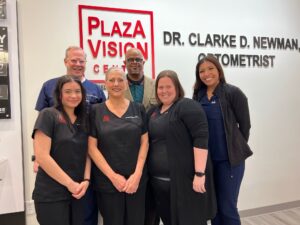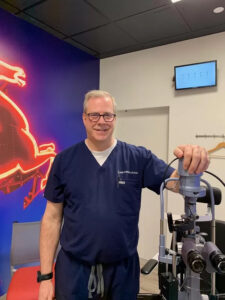
Dr. Newman (back row, far left as you are looking at photo) says he has been able to achieve practice success despite having to learn business skills on the fly after becoming a practice owner.
By Clarke D. Newman, OD, FAAO
May 31, 2023
When I was a little kid, I started to race small sailboats like my dad; I still do so today. As I grew up, I learned early to model the behavior of the best sailors and to accept the counsel of the experts as they tried to inculcate into our tiny, pea brains the best practices and methods for becoming experts ourselves. We were taught to recognize and read patterns. We were taught how to become experts.
I say that I am a better racing sailor than 99 percent of the racing sailors out there; I just spend all of my time sailing against the other 1 percent. I wouldn’t have it any other way. It is how one gets better.
Surround Yourself with the Best
That experience mapped onto me as an optometry student. I quickly realized that clinical practice was much like racing boats at an international level. So, I surrounded myself with the best faculty we had at University of Houston College of Optometry in the mid-1980s and others later in clinical practice. I listened to them and ignored/tolerated the rest.
As a result, I became an excellent clinician. I tell people that inside the exam room, I think I am as good as anyone out there in my area of specialty. The world is big enough for many outstanding clinicians in different areas of specialty. I think I’m one of them, and I love hanging out with, and learning from, the rest in all my endeavors in the profession. You should do the same.
What I neglected to do was to do the same thing as a businessperson. To be fair, we got next to nothing by way of practice management instruction back when I was in school, but, mostly, this shortcoming falls on me. I mean, I was taught how to file 941 IRS filings through angry letters from the IRS. I had no clue.
I knew I would own my current practice when I was a teenager. My dad was a pretty good dentist and a fair-to-lousy business person, and I seemed to follow that same path. I should have planned on being a businessperson sooner.
One of your closest friends on the planet is Laurie Sorrenson, OD, FAAO, the professional editor of this publication. When spending time with her, you quickly realize just how far from an expert businessperson you are. Compared to Dr. Sorrenson, who lives, breathes, sleeps and laughs all the way to the bank as a maven in optometric business, I am about average in my back office, at best. There is a reason she is the editor of this publication. She has walked the walk. No, she has run the walk. I listen to her, even when I don’t want to.
Now, I did become a coding and billing expert, and I am widely regarded as such, but I did that out of sheer desperation. I just wasn’t earning a living being the vaunted specialty lens prescriber that I supposedly was. When I learned those skills, it never occurred to me at the time that I would lecture on that topic close to 80 times. Yet, here I am—still average.
So, why do I think I am average? Well, the milestone percentages in my practice are in line with other similar practices. I work closely with my accountant to make sure that we meet the numbers, and that experience has helped me survive the stress test of all stress tests of having a downtown Dallas practice during the pandemic.
Just before the pandemic, I had signed and guaranteed a new 10-year lease, spent significant money building out a space that was double the size of my previous office to accommodate two or three doctors, and I hired my first associate. Fate had other plans. That being said, though battered and bruised, Plaza Vision Center is still here and slowly recovering.
Other Articles to Explore
So, what can an average businessperson say to his colleagues that might make a difference? Maybe a couple of things. I have been in practice for 37 years, after all. Plus, I’m average, so, most of what I have to say here was said by optometrists better than I.
Actions to Take to Enable an Average Businessperson to Thrive as Practice Owner
Remember we are in the vision-correction business. The eyes are not vital organs. We can do without them, but who would want to? We correct the eye so that we can see, and we heal the eye so that we can see, and how we do that should animate every business decision we make. As technology turns novelty into disruption, it is best to stay light on your feet to adapt—regardless of our preconceived notions of what it is to be an optometrist.
Be what our patients need us to be. The last thing that one of my mentors, Irv Borish, OD, said to me before he died at nearly 100 years old was, “People say that optometry should be this or that, I say that optometry should be whatever our patients need us to be.” Sage advice from the greatest optometrist of the 20th century.
Prescribe & recommend with authority. Early in my practice experience, my predecessor and I brought in Dick Katouf, OD, to advise us as we added an optical to the practice and rid ourselves of the rigid lens manufacturing lab that we had. Dick gave me several ideas that I still use today. First, script everything and distill things into a “one-minute message.” Use the “power of the doctor” to “create the want and the need” in the exam room, then prescribe what you think they need with authority.
Differentiate Yourself from Your Closest Competitors. Dr. Katouf also said to specialize in something so that you stand out. You have to differentiate your practice from the others around you, and you have to know against whom you are competing. If you are a single-doctor practice, and you are trying to compete against a big-box store, you will get creamed. Define who you want to be and stay in your lane. It is also a good thing not to put yourself into a lane that is already bumper-to-bumper in your area.
Invest in your practice and your skills. Invest in income-generating technology and fresh-looking decor. Invest in your office so that you don’t look like an old, tired practice in Soviet Russia.
Hire good people first and teach them the skills they need. As the comic, Ron White, says, “You can’t fix stupid.” Dr. Sorrenson has always said to me to hire slowly and fire quickly. I’m gonna do that someday, promise. Be honest and transparent with your staff. Educate them about your vision, and stick to it. Show them gratitude; they need that just as much as they need money.
Learn how to code and bill and teach your staff how to do it so that it gets done correctly. If you want to feed your kids and pay your staff, code and bill!
Take responsibility for both wins and losses as practice owner. Something else Dr. Borish taught me was that, “Everything that happens in your practice is your fault.” Own your mistakes and fix them. If you are not making any money, it’s your fault. However, he also taught me that it is not our fault that our patients are sick. We are good at what we do, and our services have monetary value. Bill accordingly; you are not a charity.
OK, since I’m average, I should shut up now and listen to others.
 Clarke D. Newman, OD, FAAO, FBCLA, FSLS, FNAP, is the owner of Plaza Vision Center in Dallas, Texas. To contact him: drnewman@drnewman.com
Clarke D. Newman, OD, FAAO, FBCLA, FSLS, FNAP, is the owner of Plaza Vision Center in Dallas, Texas. To contact him: drnewman@drnewman.com

























